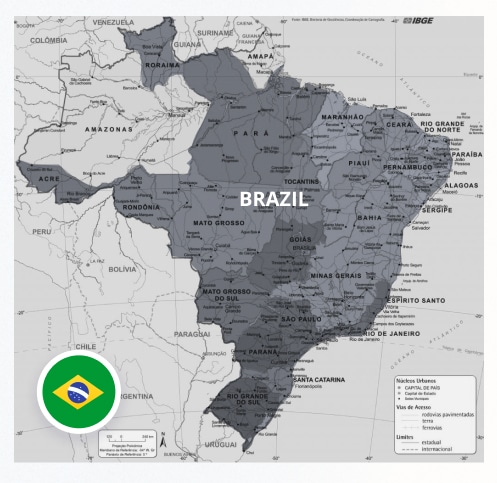Market Spotlight: Brazil



-
Brazil is an attractive emerging market to do business, with a large and growing middle and upper-class with disposable income. While the market comes with its challenges, hiring experienced partners in the region can help you secure new business and achieve sustainable growth.
-
For a large emerging economy, Brazil is only ranked 124th (of 190) on the World Bank’s Ease of Doing Business Asessment.
-
The Brazilian government works to protect local businesses. While some foreign investors may find it challenging, many have success navigating FDI hurdles and regulations, and tapping into the large population.
-
Exporting to Brazil may be costly for foreigners on certain goods, due to the high tariffs. Brazil has a 60% flat import tax on most manufactured goods from abroad.
-
Companies expanding to Brazil should identify local partners to help navigate Brazil’s complex legal and tax system. Don’t go at it alone; work with a trusted partner.

-
With Portuguese as the native language, the Brazilian population is “moderately” fluent in English, less so than its neighbors Chile and Uruguay, with a EF English Proficiency Index ranking of 60 out of 112 countries in the Index. However, English literacy rates are on the rise.
-
5% of the population has some English speaking skills. The largest concentration of fluent English speakers may be found in the major business and tourism hubs (Sao Paolo, Rio de Janeiro, and Belo Horizonte, an emerging hub for startups).
-
When doing business in Brazil, hire an interpreter or bring Portuguese-speaking business associates.

-
Brazil offers very low labor rates. In the past few decades, Brazil has kept pace and even sometimes outperformed other manufacturing powerhouses like China and Mexico in regards to maintaining low labor costs, according to Trading Economics.
-
Labor force participation in the broader economy reached an all-time high in December of 2021, more than 62%, as a result of a steadily increasing minimum wage (nearly doubled between 2010-2021).
-
However, inflation rates are on the rise globally and at the highest rate in Brazil in 26 years, according to statistics agency IBGE. Consumer spending may continue to slow in the near term.

-
Brazil earned a rating of 45 (out of 100) according to Trading Economics Political Stability And Absence Of Violence/Terrorism Estimate. This rating should encourage investors to continue to monitor safety and overall stability, and seek local guidance before making significant business decisions.
-
Foreign investors should be mindful of choosing well-developed regions and neighborhoods to set up new operations.

-
Brazil’s government is a democratic federative republic with a presidential system. Like other countries in the region, Brazil is somewhat politically polarized. The lead-up to the October elections should be monitored to determine which political direction the country will take.
-
Brazil’s multi-party system has proved it lacks consistency. Candidates from the Worker’s Party, Brazilian Democratic Movement, and Brazilian Social Democracy Party, just to name a few, have all been elected in the past two decades.
-
With a number of controversial policies and issues on the line, foreign investors should be aware of the potential for more specific and potentially less widespread investment opportunities.

-
One of the world’s five BRICS emerging economies, Brazil is currently the 12th largest economy in the world, with a GDP of about 1.6 trillion USD according to the World Bank.
-
Brazil continues to grow at an impressive rate. Despite a drop in GDP growth in 2020 as a result of COVID-19, Brazil realized a 4.6% increase in GDP in 2021, a rate unseen since 2011.
-
Unemployment is low, having reached 10.5% in February, the lowest it’s been since 2015 ( 8.5%).
-
Some of Brazil’s most stable and successful industries include petroleum processing, automotive, cement, iron and steel production.

-
When greeting a Brazilian delegation, shake hands with all of the attendees. Developing personal relationships with your Brazilian business partner is important, so don’t be surprised if it takes several meetings to finalize a deal.
-
Punctuality is more fluid in Brazil, so your business counterpart may arrive a few minutes late. However, always be punctual.
-
Dress code may vary but when there’s doubt, dress formally.
-
Exchanging gifts is uncommon in most settings, however sending a gift following a business meal (e.g., flowers) is appropriate. (Refrain from giving black or purple gifts, as these colors are often associated with funerals).


